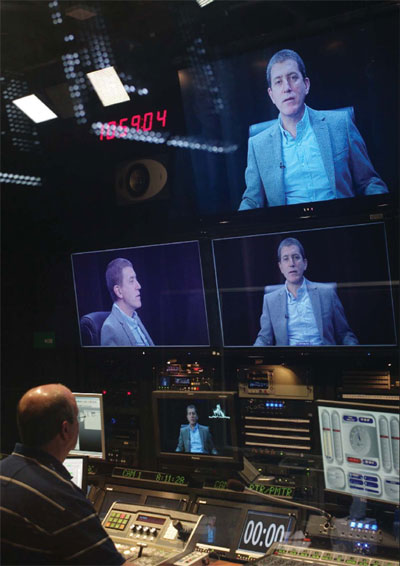Elite courses, free for all
Updated: 2012-12-02 07:59
By Tamar Lewin(The New York Times)
|
|||||||
|
Mitchell Duneier of Princeton University is adapting his classroom teaching style for an online audience. Ozier Muhammad / The New York Times |
Top schools offer their classes online
Teaching Introduction to Sociology is almost second nature to Mitchell Duneier, a professor at Princeton University in New Jersey: he has taught it 30 times, and a textbook he co-wrote is in its eighth edition. But last summer, as he transformed the class into a free online course, he had to grapple with some brand-new questions: Where should he focus his gaze while a camera recorded the lectures? How could the 40,000 students who enrolled online share their ideas? And how would he know what they were learning?
In many ways, the arc of Professor Duneier's evolution, from professor in a lecture hall to online instructor of tens of thousands, reflects a larger movement, one with the potential to transform higher education. Already, a handful of companies are offering elite college-level instruction - once available to only a select few, on campus, at great cost - free, to anyone with an Internet connection.
Moreover, these massive open online courses, or MOOCs, harness the power of their huge enrollments to teach in new ways, applying crowd-sourcing technology to discussion forums and grading and enabling professors to use online lectures and reserve on-campus class time for interaction with students.
The spread of MOOCs is likely to have wide fallout. Lower-tier colleges, already facing resistance over high tuition, may
have trouble convincing students that their courses are worth the price. And some experts voice reservations about how online learning can be assessed and warn of the potential for cheating.
MOOCs first landed in the spotlight last year, when Sebastian Thrun, a professor at Stanford University in California, offered a free artificial-intelligence course, attracting 160,000 students in 190 nations. The resulting storm of publicity galvanized elite research universities to begin to open higher education to everyone - with the hope of perhaps, eventually, making money doing so.
Millions of students are now enrolled in hundreds of online courses, including those offered by Udacity, Mr. Thrun's spinoff company; edX, a joint venture of Harvard and the Massachusetts Institute of Technology; and Coursera, a Stanford spinoff that is offering Professor Duneier's course and 200 others.
They appeal to a broad audience: retirees in Indiana see the courses as a route to lifelong learning, students in India as their only lifeline to college-level work.
"It was really intimidating at the beginning to do these lectures with no live audience, no sense of who was listening and how they were reacting," Professor Duneier said. "I talk about things like racial differences in I.Q., Abu Ghraib and public bathrooms, and I worried that my lectures might come across as examples of American ethnocentrism."
When his first lecture went online, students wrote hundreds, then thousands, of comments and questions in online discussion forums. Crowd-sourcing technology helped: every student reading the forum could vote questions and comments up or down, allowing him to spot important topics and tailor his lectures.
Top universities with courses like Professor Duneier's stand to gain, both in prestige and in their ability to refine their pedagogy; few seem worried about diluting their brand-name appeal. The risks are greater for lesser colleges, which may be tempted to drop some of their own introductory courses and substitute cheaper online instruction from big-name professors.

"We've reached the tipping point where every major university is thinking about what they will do online," said Peter McPherson, president of the Association of Public and Land-Grant Universities. "In a way, the most important thing about these MOOCs from the top universities is that they provide cover, so other universities don't need to apologize about putting courses online."
The University of Texas announced that it would use edX courses for credit. Students in one Udacity class can get credit through the Global Campus of Colorado State University. Most MOOC providers are making plans to offer credit - and charge fees for certificates and proctored exams. Princeton does not give certificates of completion.
The earliest MOOCs were concentrated in computer science and engineering - subjects suited to computer grading - but Professor Duneier is offering humanities courses, in which the grading process is handled by the students.
To create the feel of a seminar, Professor Duneier used a video chat room in which six or eight students - from Katmandu or Siberia or Iran or Princeton - discussed the readings.
For Doug MacKenzie, 34, a Philadelphia firefighter, the video chats with far-flung classmates were the highlight. "I was just thinking, this is really neat, to be able to talk to someone in Siberia," he said.
The zero price tag was crucial. "I've always wanted to go into a degree program, but the problem is that I don't have the money," said Mr. MacKenzie, who has taken four MOOCs. The approach is still experimental.
Each student must score the work of five classmates to get their own score, the average of what their peers gave them. Professor Duneier and his assistants have graded thousands of finals, checking the scores they assign against those given by students. So far, he has found an impressive correlation of 0.88.
In hand-grading the midterm, Professor Duneier and his assistants found that about 3 percent of the students had plagiarized. But right before the final, Professor Duneier detailed the rules for a closed-book exam. "I said, 'Don't use your notes, don't Google, don't ask your wife,'" he said.
The hand-scorers have not yet detected an instance of plagiarism.
The New York Times
(China Daily 12/02/2012 page9)
